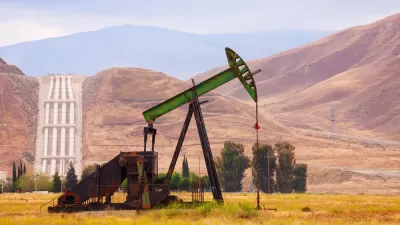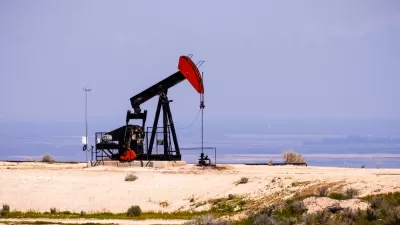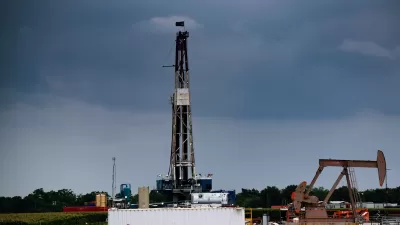Oil drilling has brought abundant prosperity to North Dakota over the past few years. Nicholas Kusnetz exposes the impact of weak environmental regulation in the state.
Oil drilling and hydraulic fracturing offer some very appealing benefits. Drilling sites are bound to boom with an influx on money and people. Businesses flourish. Jeff Keller, a natural resource manager for the Army Corps of Engineers in Williston, ND, describes the packed theaters, sold out grocery stores, and rising rents he has seen since drilling came to his town. It's good for business, and natural gas holds the possibility of oil independence.
But, as North Dakotans are learning, the environmental impacts of drilling and fracking are undeniable. The "salty, chemical-infused wastewater, known as brine" that is produced with each drilling project is supposed to be injected into underground disposal wells. Nicholas Kusnetz reports that much of this waste is leaked, spilled or dumped illegally. Across the state, farmers have reported loss of land, property owners have reported damage to land and waterways. In some cases spills near streams have wiped out entire wildlife populations.
"Kris Roberts, who responds to spills for the Health Department, which protects state waters...acknowledged that the state does not have the manpower to prevent or respond to illegal dumping," writes Kusnetz.
"It's happening often enough that we see it as a significant problem," Roberts said. "What's the solution? Catching them. What's the problem? Catching them."
Thanks to Jessica Brent
FULL STORY: North Dakota’s Oil Boom Brings Damage Along With Prosperity

Maui's Vacation Rental Debate Turns Ugly
Verbal attacks, misinformation campaigns and fistfights plague a high-stakes debate to convert thousands of vacation rentals into long-term housing.

Planetizen Federal Action Tracker
A weekly monitor of how Trump’s orders and actions are impacting planners and planning in America.

San Francisco Suspends Traffic Calming Amidst Record Deaths
Citing “a challenging fiscal landscape,” the city will cease the program on the heels of 42 traffic deaths, including 24 pedestrians.

Defunct Pittsburgh Power Plant to Become Residential Tower
A decommissioned steam heat plant will be redeveloped into almost 100 affordable housing units.

Trump Prompts Restructuring of Transportation Research Board in “Unprecedented Overreach”
The TRB has eliminated more than half of its committees including those focused on climate, equity, and cities.

Amtrak Rolls Out New Orleans to Alabama “Mardi Gras” Train
The new service will operate morning and evening departures between Mobile and New Orleans.
Urban Design for Planners 1: Software Tools
This six-course series explores essential urban design concepts using open source software and equips planners with the tools they need to participate fully in the urban design process.
Planning for Universal Design
Learn the tools for implementing Universal Design in planning regulations.
Heyer Gruel & Associates PA
JM Goldson LLC
Custer County Colorado
City of Camden Redevelopment Agency
City of Astoria
Transportation Research & Education Center (TREC) at Portland State University
Jefferson Parish Government
Camden Redevelopment Agency
City of Claremont





























